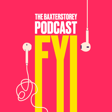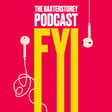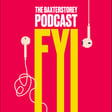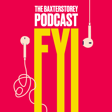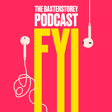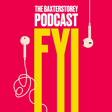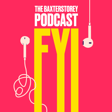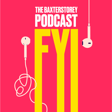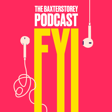Introduction to FYI Podcast and Guest
00:00:04
Speaker
Hello and welcome to FYI, the Back to the Story podcast. I'm Sam Wacombe, your host for our inclusion series, shining a spotlight on unique stories from people across our business. As we celebrate Menopause Awareness Month this October, our guest today is Kerry Barrett, accounts director at Back to the Story, who is currently navigating the menopause journey.
Menopause Awareness in Gender Identities
00:00:23
Speaker
In this episode, Kerry will guide us through her experience with menopause and raise awareness about this transformative phase. During this podcast, we use the term women with no intention of exclusion. It is important to highlight that not only those who identify as women may experience menopause or symptoms. For example, some transgender men, non-binary people, or intersexual people, or people with variations in sex characteristics may also experience
Kerry Barrett's Career Journey
00:00:49
Speaker
menopause. Kerry, thank you so much for joining our podcast.
00:00:53
Speaker
for our listeners, can you just tell us who you are? I'm Kerry Barrett and I've been with Back to the Story for a length of 24 years and I am currently accounts director for London. I started actually in the same building that ASOS is now, so it was Thompson holidays and then I started for Houston and Church who became WSH who became Back to the Story, so we kind of innovated over. But I started making sandwiches. I studied theatre, so I came to London
00:01:21
Speaker
to seek fame and made sandwiches. The plan was for just two weeks and here I am 24 years old. I love it, I wouldn't do it. It's an interesting one because it was a temporary job and then I went onto a training management scheme and I think because we have the ability to move up the ladder
00:01:40
Speaker
promotion and also move in different locations, which is almost like starting a new job every time. Each role that I've done is like a new job, so it doesn't feel like 24 years. With what you're in today, talk about your menopause journey. Can you tell us when did you start going through menopause?
Menopause Symptoms and Realizations
00:01:55
Speaker
That is an interesting question because I have no idea. I guess I noticed physical changes, not mental. That's around cycle, probably tiredness, and then started to go and see the doctor. And then because my partner, who's female,
00:02:10
Speaker
I'd been going through it three years before she's three years older than me. I had similar symptoms and similar behavioral symptoms. I was like, oh, I recognise that in myself. So I don't think anyone really knows actually when does it start because there's perimenopause, menopause. I don't even fully understand what that is. But all I know is that you can definitely start to see a change.
00:02:32
Speaker
We spoke just around, if it wasn't in social media, if there was not people like Davina McCall, Naomi Watts, who were real, like, applicants for it, I probably wouldn't recognise it. I'd probably just think, it's tired, I'm getting old. It's just getting old. I think the mental, the emotional, the memory, you just looked down to age, or I would have done, I think, if it wasn't for people, people like who shouts about it now, but Davina McCall, I remember listening to her podcast, and I was a bit like,
00:03:01
Speaker
Oh, that's me. Oh, that's me. Ah, that's me. I can't remember anybody's name anymore. I can't remember anything. I think I'm having a breakdown. Oh, yes, that's me. So what are your symptoms? Numerous symptoms. I would say in the last really taken effect in the last two years. Yeah. Maybe two years. I turned 50 in June. Yeah, June. I don't feel it. Inside, I don't feel it. The first thing I noticed was
Coping with Menopause in the Workplace
00:03:23
Speaker
my cycle. I literally was on my cycle for a year, almost.
00:03:27
Speaker
non-stop. You mean you were bleeding? Yeah, bleeding for a whole year, all the way through a year. And is that common? So I think maybe it is a lot, but I think having longer periods and different cycles of period start is one of the signs. So some people, or heavier periods, for example.
00:03:47
Speaker
For me, that was quite, it caused tiredness, low iron, that's when I went to the, I know, I'd never look after myself. It was probably four or five months before I actually went to the doctor's and said, hang on a minute, hang on, this isn't right. And the impact of that, because it's tiredness, so you don't know, I was talking to someone the other day, I was in my bag, it was literally carrying a spare pair of trousers, pants, everything was okay. How do you think that prepared, like, that more than a couple of weeks? Yeah, yeah, yeah, because you don't know, it's, well, I got, this is my own experiences.
00:04:17
Speaker
I don't know when it's gonna come on, how heavy it's gonna be, where I am at the recent rise event that we had in ASOS, which was great by the way, those women together just be really open. I opened up about being in a client room and literally flooding all over the chair in a brand new office. It was brand new, they've designed it all, it was all like pastel colours. And I was like, what the hell do I do? What do I do?
00:04:44
Speaker
horrendous. Now I was actually in the middle of a meeting with my manager in one of these rooms and I came out and I pushed in the chair and then kind of went to the toilet to get a towel which I then bumped into the client on the way back and actually I was just honest. I said I'm really really sorry because I couldn't leave it. No, not yet. I just run off and leave this all over the chair but I was actually really honest and
00:05:09
Speaker
which was unlike me, I wouldn't be looking forward to things, but I just thought, you can't, this is natural. So I just made a little bit of a mess in the room. Would you like me to sort it out? How did the client handle that? He was good actually, he was really lovely. So it was a male. It was male, luckily he's...
00:05:25
Speaker
very open and he was like let me contact the clean socket, don't worry about it. He was absolutely really lovely because actually he wasn't embarrassed which was nice for me because I think if he had been a double white male embarrassment he was really lovely. So that, because I could have just hidden it.
00:05:40
Speaker
And after I thought that, I was very proud of myself for being open. But during the rise talk, there was other women there and a couple of people approached me about similar experiences because I'd opened up in the rise event. But that is, if you think in my job, because I don't have a base, I'm not based in one location, I have a what if bag. Does that mean? What ifs? I've got my laptop, I've got my charger, I've got my notes, I've got two phones, my postal phone, work phone,
00:06:17
Speaker
and you don't know? No, so it has got better to be fair. That happened for a four year. The doctor, to have tests, the doctor put me on some tablets to stop it. And then I didn't have one at all for four or five months. And I was like, yay, it's finished. And then, hey, they're back. And they're back on a normal cycle. Obviously, I talk to my mum because I was like, how did this work for you? And my sister's, I have two older sisters. And my sister is five years old and she's just stopped. And I was like, oh God, 55. I've got another five years of this.
00:06:45
Speaker
My mum was around about 50, but also went through similar experiences to me with regards to just being very heavy. And not knowing when it's coming. So there wasn't that cramping, no symptoms? No, nothing, nothing.
Pandemic Stress and Menopause
00:06:57
Speaker
You do not even know it's coming. I think we've all had that accident, but I think what's more extensive when you go through this is they're much heavier. It literally is much, much heavier than any normal period or accident, and you just don't know when, so you can never be prepared.
00:07:12
Speaker
When you were going through, well you still are going through the menopause, did you feel like people were talking to you about it? Not really, I guess it's a difficult one. I think it's more open now, so I know I've got colleagues, Sam Hemling, she's pretty much a little bit younger than me, but we talk about it a lot. I know Natalie has spoken about it, so I think we are more open about it. But you can't fix it, it's happening, you have to live with it.
00:07:40
Speaker
It's how we recognise it and what we do with it. And I actually don't have the answers to that. It's like, how? What do we do with this? Because it's not, I'm just talking about the cycle. But then there's also exhaustion, memory loss. I can be in a meeting and then suddenly I'll forget names. I'll forget what I'm trying to say. And I'm like, how the hell am I going to cope with this? And if you're in the client meeting, it just makes you look...
00:08:03
Speaker
completely stupid. For me, that's more difficult because I can control the other in a way. Yes, there's an accident, but I've got my bag and everything in it. So I have slight control over that. You can't carry a kit from your memory. No, you can't. So I really struggle with that. I think that's the biggest thing that I struggle with, tiredness, coping, some days, probably things that you probably would have coped with naturally previously are really difficult now.
00:08:29
Speaker
But it's really hard to say and pinpoint. That's because of the menopause. And I think historically that's probably why it's not been recognised. And it's only because people are talking about their symptoms that there's a pattern with women of our age that you go, God, it's not just me. And actually these symptoms are because of that. Had you anticipated what was happening?
Partner's Menopause Experience and HRT
00:08:52
Speaker
Your partner was going through it. Yeah, I mean, I still think, you know, people talk about hot sweats and my partner had hot sweats, I've not had them at all. I'm thinking, are they to come? Yeah, I'm just going through the madness bit, the cycle bit, the sweater to come. But for her was around really mental health, really struggling, just breaking down crying for no reason.
00:09:12
Speaker
But funny, I came up Liverpool Street Station the other day and there was a violinist. I just burst out crying. I mean, this is insane. I mean, it was a lovely violinist, but normally I wouldn't cry. And I think something around your emotion is a much more prevalent, I don't know, there's some 100% item that is down to, or like I said, let's say about
00:09:33
Speaker
I also suffer from claustrophobia, which I felt increased out of the pandemic, but it's heightened even more so. So getting on the tube, I have to work out where I'm going. I feel like everything you have has probably heightened somewhat through the medicals. Yeah, stress levels, probably coping mechanisms. You started during the pandemic. How did you find them? I think it hit more when I came out of the pandemic, because you can cope with it. You know, in lockdown and things, you kind of cope with it. Or actually what I felt was
00:10:00
Speaker
maybe some of the symptoms was due to the pandemic, not to the menopause, and that's where they kind of overlapped, because I was talking to people coming out of the pandemic going, actually, I can't be around people anymore, finding it, and I was thinking, wow, is this heightened anxiety because of lockdown, which partly may have been, but because it's carried on, et cetera, et cetera, and obviously now I know
00:10:24
Speaker
what I'm going through, then I think, well, I probably had a double whammy post COVID, post COVID into the menopause. And again, as I said from my partner, who is a senior fire officer, came out of Grenfell. So that's, again, that's what we're saying is how do you identify exactly that it is the menopause? And apart from having a test that says, yeah, tick you on the menopause, you could relate these symptoms to many things.
00:10:48
Speaker
life, what you're going through, incidents, but if it wasn't for people talking about it and everyone recognising it is definitely related to this, would I be able to identify it? You said that your mental health wasn't as impacted but your partner's was. My partner's symptoms were more coping mechanism
00:11:09
Speaker
sort of normally dealing with stress. Normally you have the ability to deal with a level of stress and you know your own self. I think everybody knows their tolerance, they know what they're capable of and I think she reached a point where she was not able to cope with certain things that she'd normally been able to cope with and things were causing anxiety that she wouldn't normally. So you kind of question your own self. I think everyone knows their own body.
00:11:33
Speaker
and what your normal strengths are, what your normal coping is, what's your pinch points, and suddenly this changed. Suddenly, you know, anxiety kicks in for no reason, just no reason, lack of sleep. That was huge. You mentioned two of us in bed, one just starting the menopause, the other one not sleeping. It's like, great, and actually that had a massive effect on me because I wasn't sleeping, she wasn't sleeping.
00:11:57
Speaker
and it was just horrendous. How is it now? Is it getting easier?
Balancing Career and Menopause
00:12:02
Speaker
Well, she actually went on HRT. She went to see a private doctor because the doctors actually weren't great. They were just, you have high blood pressure, we can't put you on anything. So she went to a private doctor who then did blood tests. They talk about the work because obviously she works shifts. They go through your lifestyle and then they put you on certain medication and then monitor.
00:12:23
Speaker
three months down the line, how you're feeling, whether it works for you. Since then, she's been sleeping much better. The anxiety is much better. So for her, that definitely worked. I'm not on anything at the moment, but I do think I'm at that point where it's like, right, OK.
00:12:37
Speaker
It's now time to go and see, yeah, because I don't think this is sustainable because I definitely feel that anxiety, the tiredness. So I feel about that point. I'm northern. We don't go to doctors. We don't go to the doctors. We just get on with it. But I am actually at that point where, oh, right now, you know what? I'm going to see if it helps. And then there's that whole thing of whether it's right, whether it's wrong. I don't think you just need to do what you feel is right for you. Do you think there's more of that workplaces
00:13:07
Speaker
need to support? Will we go through menopause? And if so, what? But if I was an employer, I would find it really difficult. And I think, number one, doing things like this is amazing. So just to open up and say, and we're recognising it as a company, we're talking about it, you know, the roots, like the rise, just amazing. All the groups that are now happening for the LGBT and the women in the workplace is great. I think we need to do more of them.
00:13:34
Speaker
100%. What I would do as an employee is hard. It's almost like, how do you manage sickness? This isn't a sickness, by the way. Don't quote me on that. But how do you manage when it's constant? I think the only thing you could do is support and recognize when people are struggling.
00:13:52
Speaker
but I don't have that answer and I would not want to be the employer because I don't know. But I do think it may be performance dips or tiredness creeps in, maybe recognizing it and having those chats, maybe your line manager or your senior boss or us as colleagues, if we recognize it and people just say, hey, do you want to come and have a chat
Social Stigmas and Openness
00:14:12
Speaker
for an hour? We recognize this. Are you okay? Some kind of that mentoring rather than
00:14:18
Speaker
Time-off is not the answer. Have you had someone who's got menopause come to you? Well, I think it's me. I think we're very open. Colleagues and I talk about it. We're very open. Usually, obviously, women. I'm very vocal. In fact, I'm a bit tired of hearing myself say, I'm menopause. And I probably use it for things that I'm not. Yeah, that's because I'm menopause. I've got bad tasting shoes. That's because I'm menopause. What is the outfit? Menopause.
00:14:48
Speaker
So, these are playing it for everything, but I do hear myself saying that a lot. I love life, but it is, you know, it affects so much in your life. It affects so, so much. And yeah, I definitely don't have the coping mechanism that I used to, or resilience at this moment. And whether that's for life, whether it is just a period of time, I'm not coming out the other side yet, so interview me when I come out the other side. But actually, they did mainly as a business to get those different levels.
00:15:18
Speaker
people who have come out of it, maybe in how they're feeling now, people who are going through it, people who are just starting perimen, is it perimen? I don't even know. I don't actually know what it means. I just know what I'm going through. Yeah. Do you have any stories you'd like to tell us that have really stood out over the past few years? I think because it's ongoing and it's not just about incidents. It's about ongoing things. It's about how you're feeling
00:15:46
Speaker
in your life and it's constant, it doesn't go away. It's very hard to pick out. But I think the only thing I could say is anxiety and my fears and phobias escalating way above how they would normal. So I've always had an issue with the underground.
00:16:00
Speaker
if it gets stuck and then literally going into a little internal meltdown, sometimes external. So I learned to have coping mechanisms, but now it's escalated into such a high that coping mechanism doesn't work. So now I either have to walk or I think about travelling at different times of the day, so it's less busier, or I find I work out, literally, I know which carriages are the less busy.
00:16:25
Speaker
and sometimes I have to get off and back on again, off and back on again. So that's an example of something I've had all my life but it's escalated so it's harder to cope with. I literally did a journey to a meeting and it was in Kings Cross and I think I got off the tube four times and just sat on the platform and got back on. But it's definitely, you know, I've lived in London 25 years, it's definitely something that's changed and escalated.
00:16:50
Speaker
over time and even more so going through the menopause. I've always been on the tube. I used to love it. Yay, it's the underground. I'm from up north. Look at this. But actually, yeah. And I just think it's these... And if I listened to people through the menopause, it's about heightened anxiety. And I would probably relate that to heighten anxiety to your own fears and things like that.
Menopause's Impact on Relationships
00:17:15
Speaker
Going through menopause with your partner, has it impacted your relationship?
00:17:19
Speaker
Has it put a strain going through it together? I think it did when my partner was going through it, because of the lack of sleep. So I think we were very tired, so that obviously leads to short temper. We never argue, we've been together for how long? 20 years? Celebrating 15 years of civil partnership. Yeah, in September. September, yeah, 15 years.
00:17:42
Speaker
So we get on so well. So when we found ourselves snapping at each other, because it's very unlike us to do anything like that, it's because we were tired. And again, when we're talking about work, she's in a very senior role.
00:17:56
Speaker
lots of stress. Normally you'd be able to come home and cope with it. So both dealing with that stress level through the menopause is not easy. This is what we're saying about supporting women in the workplace to climb the career ladder. When you're going through, for people who have kids you've got to go through that. You've got to come out that side, then you go to the menopause. And it's not an easy journey for females. It's not an easy journey. And my partner was obviously in the London fire brigade and that's not a women's world.
00:18:25
Speaker
Yeah, very male dominated. Yeah, not great. But they're working on it. I would say our industry is very male dominated.
Challenges in Male-Dominated Fields
00:18:34
Speaker
How do you find that? I think we need to change that 100%. And that's probably why. Because if you think about why I'm going through
00:18:41
Speaker
how I'm feeling, I wouldn't even want to go any further. And actually we don't recognise that and I think half to Sarah and everyone. And also having kids and having to deal with that. I know one of the other ops has got three young children and I think how in the hell does she hold this job down and have three young kids?
00:19:02
Speaker
Wow! I'll shut up Mona because she's a superstar. I don't know how you would do that. I'm not saying that I feel like I'm just talking one-sided because obviously men have this as well. But I do think it's harder in the workplace for women. And actually does that get recognised, the menopause?
00:19:20
Speaker
I think if you talk to women about it, it's fine. But would you feel comfortable bringing this subject up to a male boss or a male senior person?
LGBTQ+ Struggles and Progress
00:19:28
Speaker
Probably not. Probably not. I think because I'm more of a, you know, I'm here today, which is good for everyone. But I just think normally it's how you talk about it in passing, rather than sitting down and saying, it's more about, oh my God, this is happening to me. Yeah, this happening to me, rather than saying, actually, how is this impacting your job and role?
00:19:48
Speaker
Actually, I'm answering our question earlier. I'm actually probably physically saying, how do you feel this is impacting your role? What can we do about this in your role? I think everyone is talking about it more and talking about recognising it. But I've not heard anyone go, hey, you know what my company did and this was amazing. And it really worked. So if anyone has, come and tell us a story. Yeah, we'd love to hear those stories. Yeah, we'd love to hear it because like I said earlier, I don't have the answer.
00:20:16
Speaker
So it'd be great to hear anybody who does work in a company that has been really effective in what the company's done. But I do think women are getting stronger. The next generation in, lo and behold, the future, go girls. Because I do think it's a lot, and just even going back to being gay. When I first met my partner, being married was illegal.
00:20:40
Speaker
Illegal. And it's only 15, well 15 years ago, we were still illegal. We had a civil party because marriage was not legal. And only then 10 years afterwards, slightly before did marriage become. So, you know, if I think about that side of my life, it's like, wow, that's insane. I could not marry my partner. This is like just 20 years. And only 10 years ago, I can't remember the exact date, were they there. Okay, we'll allow marriage. What?
00:21:09
Speaker
And then we're still fighting. In the UK, this is great, but we're still fighting across the world. Is there anything you'd like to share with that on your own? When I was young, I didn't realise at school, which I kind of was thankful for, in a way. Yay, I didn't know. I was oblivious. And then I realised when I was probably about 18, and my first thing was obviously my mum found out, and she actually threw me out.
00:21:36
Speaker
So that was quite impactful. So I didn't live at home for a year. My mom would rather not have spoken to me than tell people that I was gay. So I went through all of that for a year. And now my mom thinks I'm the best thing since sliced bread. Look at what you've done with your life. And look at your sisters. No, I'm joking. I'm only joking. Actually, I've made hair a bit more open and wise to it. I guess wise to it. It's a disease.
00:22:05
Speaker
But for me, that's always had an impact on telling people. Even now that I'm about 50 and I was 18, I still find it hard to tell people I'm gay. Really, I always kind of veer off and people always presume you're not.
00:22:20
Speaker
So if I talk to people generally, oh, how's your husband? Or what does your husband do? And then I go, oh, a firefighter. And they go, so that's automatically assumed as male. Again, I don't even have like a, not that there is a male or female profession, but they just presume. So I was having this conversation with a friend about how many times you have to come out in your life when you're gay because people presume. And there's nothing wrong with that. It's not homophobic. I've never experienced my mum when I first came out.
00:22:47
Speaker
ever experienced homophobia and I think I'm quite lucky. And I think everyone I've ever worked with in Back to the Story has probably been so supportive. It's just my inner, sort of that one scenario has made me very nervous about telling people. It's crazy, I mean, what, it's like 30 years ago and I'm just like, okay. And I'm married for 20 years. But I do find it, like it's really hard for me to tell people
00:23:16
Speaker
So when people just automatically know, they're like, yeah, it's fine. Does your partner feel the same? No. She's always been gay since she was two. And her mum was really supportive. She's very open.
Importance of Openness and Support
00:23:28
Speaker
Me, however. Which is strange because she's definitely more reserved and I'm the more open one. We used to have an employee, but it's a story he doesn't work here now. He still, to this day, is the same age as me. He does not talk to his family at all because they disowned him.
00:23:42
Speaker
and he still does not have anything to do with it. And he was my age, so we were talking about it. I said, this is my mum day, and he said, ah, this is what my family did, and that we still to this day, we've never spoken. And that is crazy. That's your son. Any final thoughts? No, I just think, you know, I think it is really important that we're all open about everything. And I think everyone needs to be honest. I do think people need to recognize it in people. I think people need to be more supportive of people.
00:24:10
Speaker
I just think, let's talk about it, girls and boys. Yeah, there's lots of people that go through menopause, which is a bit so definite. Absolutely. Everyone who's going through it just to prop up in this conversation. It does make you feel better. And like I said, even when we did the Rise event and I opened up and then a couple of other people opened up about there, they probably haven't ever spoken about that. But I would honestly, and everyone says this, honestly, when you're old, do not worry about what you look
Media Influence and Story Sharing
00:24:34
Speaker
like. No one cares, because everyone is always too bothered what they look like themselves to bother about what you look like.
00:24:40
Speaker
That's a really good tip. Get on with it. Enjoy your life, honestly. Enjoy your life. I feel like I'm 80 and about to die, but I still have life in me as well. You'll always go through everything and go through puberty. You go through all of that. We all go through different stages. Just be open and honest. Don't keep anything in. Just be open and honest, whether it's someone close to you or
00:25:04
Speaker
Yeah, just the more you talk about it, the better, and that's in every situation. There's my tip, just be, just talk to it. And you did find resources for it to be in Macaula. Yeah, yeah, so Naomi Watts, who's an actress, obviously my age, older. It's more out in the open, and if you go on Instagram, is it Lisa Snowden? She's huge, she's huge about it. So there's so many women who are, listen to it, like I said, Davina Macaul,
00:25:31
Speaker
Lisa Snowden, you recognise symptoms. Because if they weren't open, I probably wouldn't go, oh my God, that's happening to me. That's happening to me. And one, I think Davina McColl tells a story where she's done this job for years. So she quite naturally can be in front of the camera reading the autocues. And she just kept messing up. And she just couldn't get it right. She couldn't get the momentum. She just
Conclusion and Encouragement
00:25:55
Speaker
couldn't. She kept getting everything wrong.
00:25:57
Speaker
And this was going on and on. And she said, I've done this job for years. I know how to do this. And then she just locked herself in a changing room and cried. And that's a really good example of sometimes how you feel. And for example, if I'm in a meeting and then I forget words or, you know, more anxious than normal or.
00:26:15
Speaker
you just want to run away. So stories like that, that help you feel normal, if that makes sense. So the more people should talk about it and open up about their experience in stories because it does not make you feel so isolated. So they're amazing. Yay, Davina. Thank you, Kerry. No worries, it's been great. It's been a great, happy part of our podcast. Thank you for allowing me. Thank you so much. Thank you listeners. You've been listening to FYI. The back to story podcast.

